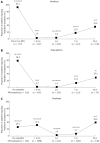Systematic review: laparoscopic fundoplication for gastroesophageal reflux disease in partial responders to proton pump inhibitors
- PMID: 24574753
- PMCID: PMC3921489
- DOI: 10.3748/wjg.v20.i3.804
Systematic review: laparoscopic fundoplication for gastroesophageal reflux disease in partial responders to proton pump inhibitors
Abstract
Aim: To assess laparoscopic fundoplication (LF) in partial responders to proton pump inhibitors (PPIs) for gastroesophageal reflux disease (GERD).
Methods: We systematically searched PubMed and Embase (1966-Dec 2011) for articles reporting data on LF efficacy in partial responders. Due to a lack of randomized controlled trials, observational studies were included. Of 558 articles screened, 17 were eligible for inclusion. Prevalence data for individual symptoms were collated across studies according to mutually compatible time points (before and/or after LF). Where suitable, prevalence data were presented as percentage of patients reporting symptoms of any frequency or severity.
Results: Due to a lack of standardized reporting of symptoms, the proportion of patients experiencing symptoms was recorded across studies where possible. After LF, the proportion of partial responders with heartburn was reduced from 93.1% (5 studies) to 3.8% (5 studies), with similar results observed for regurgitation [from 78.4% (4 studies) to 1.9% (4 studies)]. However, 10 years after LF, 35.8% (2 studies) of partial responders reported heartburn and 29.1% (1 study) reported regurgitation. The proportion using acid-suppressive medication also increased, from 8.8% (4 studies) in the year after LF to 18.2% (2 studies) at 10 years. In the only study comparing partial responders to PPI therapy with complete responders, higher symptom scores and more frequent acid-suppressive medication use were seen in partial responders after LF.
Conclusion: GERD symptoms improve after LF, but subsequently recur, and acid-suppressive medication use increases. LF may be less effective in partial responders than in complete responders.
Keywords: Gastroesophageal reflux disease; Laparoscopic fundoplication; Partial response, Proton pump inhibitors; Systematic review.
Figures




Similar articles
-
Laparoscopic fundoplication surgery versus medical management for gastro-oesophageal reflux disease (GORD) in adults.Cochrane Database Syst Rev. 2015 Nov 5;2015(11):CD003243. doi: 10.1002/14651858.CD003243.pub3. Cochrane Database Syst Rev. 2015. PMID: 26544951 Free PMC article.
-
Safety and efficacy of proton pump inhibitors in preterm infants with gastroesophageal reflux disease.Cochrane Database Syst Rev. 2025 Mar 11;3(3):CD015127. doi: 10.1002/14651858.CD015127.pub2. Cochrane Database Syst Rev. 2025. PMID: 40066936
-
Efficacy of Laparoscopic Nissen Fundoplication vs Transoral Incisionless Fundoplication or Proton Pump Inhibitors in Patients With Gastroesophageal Reflux Disease: A Systematic Review and Network Meta-analysis.Gastroenterology. 2018 Apr;154(5):1298-1308.e7. doi: 10.1053/j.gastro.2017.12.021. Epub 2018 Jan 3. Gastroenterology. 2018. PMID: 29305934
-
Pharmacological treatment of children with gastro-oesophageal reflux.Cochrane Database Syst Rev. 2014 Nov 24;2014(11):CD008550. doi: 10.1002/14651858.CD008550.pub2. Cochrane Database Syst Rev. 2014. Update in: Cochrane Database Syst Rev. 2023 Aug 22;8:CD008550. doi: 10.1002/14651858.CD008550.pub3. PMID: 25419906 Free PMC article. Updated.
-
Laparoscopic Nissen Versus Toupet Fundoplication for Short- and Long-Term Treatment of Gastroesophageal Reflux Disease: A Meta-Analysis and Systematic Review.Surg Innov. 2023 Dec;30(6):745-757. doi: 10.1177/15533506231165829. Epub 2023 Mar 30. Surg Innov. 2023. PMID: 36998190 Free PMC article.
Cited by
-
Treatment of Refractory Gastroesophageal Reflux Disease.Gastroenterol Hepatol (N Y). 2020 Apr;16(4):196-205. Gastroenterol Hepatol (N Y). 2020. PMID: 34035721 Free PMC article.
-
Laparoscopic antireflux surgery for refractory gastroesophageal reflux disease: long-term clinical outcomes.Updates Surg. 2023 Jun;75(4):979-986. doi: 10.1007/s13304-023-01483-x. Epub 2023 Mar 2. Updates Surg. 2023. PMID: 36862352 Free PMC article.
-
Endoscopic full-thickness plication for the treatment of PPI-dependent GERD: results from a randomised, sham controlled trial.Gut. 2022 Apr;71(4):686-694. doi: 10.1136/gutjnl-2020-321811. Epub 2021 Apr 13. Gut. 2022. PMID: 33849942 Free PMC article. Clinical Trial.
-
Outcome of laparoscopic Nissen fundoplication for gastroesophageal reflux disease in non-responders to proton pump inhibitors.J Gastrointest Surg. 2014 Sep;18(9):1557-62. doi: 10.1007/s11605-014-2584-3. Epub 2014 Jul 2. J Gastrointest Surg. 2014. PMID: 24985244
-
Proton pump inhibitor-refractory gastroesophageal reflux disease: challenges and solutions.Clin Exp Gastroenterol. 2018 Mar 21;11:119-134. doi: 10.2147/CEG.S121056. eCollection 2018. Clin Exp Gastroenterol. 2018. PMID: 29606884 Free PMC article. Review.
References
-
- van Pinxteren B, Sigterman KE, Bonis P, Lau J, Numans ME. Short-term treatment with proton pump inhibitors, H2-receptor antagonists and prokinetics for gastro-oesophageal reflux disease-like symptoms and endoscopy negative reflux disease. Cochrane Database Syst Rev. 2010;(11):CD002095. - PubMed
-
- Wileman SM, McCann S, Grant AM, Krukowski ZH, Bruce J. Medical versus surgical management for gastro-oesophageal reflux disease (GORD) in adults. Cochrane Database Syst Rev. 2010;(3):CD003243. - PubMed
-
- Donnellan C, Sharma N, Preston C, Moayyedi P. Medical treatments for the maintenance therapy of reflux oesophagitis and endoscopic negative reflux disease. Cochrane Database Syst Rev. 2005;(2):CD003245. - PubMed
-
- El-Serag H, Becher A, Jones R. Partial- and non-response of reflux symptoms to proton pump inhibitors: a systematic review of primary care and community-based studies. Gastroenterology. 2010;138(5 Suppl 1):S648–649.
Publication types
MeSH terms
Substances
LinkOut - more resources
Full Text Sources
Other Literature Sources
Medical
Research Materials

